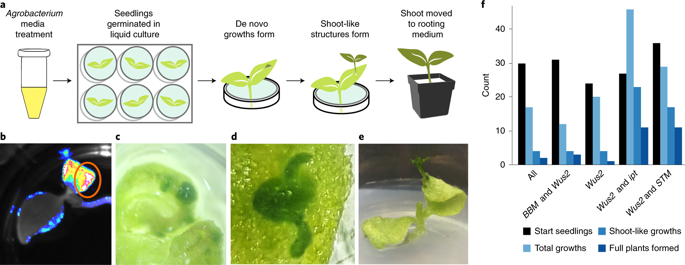当前位置:
X-MOL 学术
›
Nat. Biotechnol.
›
论文详情
Our official English website, www.x-mol.net, welcomes your feedback! (Note: you will need to create a separate account there.)
Plant gene editing through de novo induction of meristems.
Nature Biotechnology ( IF 46.9 ) Pub Date : 2019-12-16 , DOI: 10.1038/s41587-019-0337-2 Michael F Maher 1, 2, 3 , Ryan A Nasti 2, 3, 4 , Macy Vollbrecht 4 , Colby G Starker 2, 3, 4 , Matthew D Clark 5 , Daniel F Voytas 1, 2, 3, 4
Nature Biotechnology ( IF 46.9 ) Pub Date : 2019-12-16 , DOI: 10.1038/s41587-019-0337-2 Michael F Maher 1, 2, 3 , Ryan A Nasti 2, 3, 4 , Macy Vollbrecht 4 , Colby G Starker 2, 3, 4 , Matthew D Clark 5 , Daniel F Voytas 1, 2, 3, 4
Affiliation

|
Plant gene editing is typically performed by delivering reagents such as Cas9 and single guide RNAs to explants in culture. Edited cells are then induced to differentiate into whole plants by exposure to various hormones. The creation of edited plants through tissue culture is often inefficient, time-consuming, works for only limited species and genotypes, and causes unintended changes to the genome and epigenome. Here we report two methods to generate gene-edited dicotyledonous plants through de novo meristem induction. Developmental regulators and gene-editing reagents are delivered to somatic cells of whole plants. This induces meristems that produce shoots with targeted DNA modifications, and gene edits are transmitted to the next generation. The de novo induction of gene-edited meristems sidesteps the need for tissue culture and promises to overcome a bottleneck in plant gene editing.
中文翻译:

通过从头诱导分生组织进行植物基因编辑。
植物基因编辑通常通过将 Cas9 和单向导 RNA 等试剂输送到培养物中的外植体来进行。然后通过暴露于各种激素诱导编辑的细胞分化成整株植物。通过组织培养创建经过编辑的植物通常效率低下、耗时,仅适用于有限的物种和基因型,并导致基因组和表观基因组的意外变化。在这里,我们报告了两种通过从头分生组织诱导产生基因编辑双子叶植物的方法。发育调节剂和基因编辑试剂被输送到整株植物的体细胞中。这会诱导分生组织产生具有靶向 DNA 修饰的芽,并将基因编辑传递给下一代。
更新日期:2019-12-17
中文翻译:

通过从头诱导分生组织进行植物基因编辑。
植物基因编辑通常通过将 Cas9 和单向导 RNA 等试剂输送到培养物中的外植体来进行。然后通过暴露于各种激素诱导编辑的细胞分化成整株植物。通过组织培养创建经过编辑的植物通常效率低下、耗时,仅适用于有限的物种和基因型,并导致基因组和表观基因组的意外变化。在这里,我们报告了两种通过从头分生组织诱导产生基因编辑双子叶植物的方法。发育调节剂和基因编辑试剂被输送到整株植物的体细胞中。这会诱导分生组织产生具有靶向 DNA 修饰的芽,并将基因编辑传递给下一代。


























 京公网安备 11010802027423号
京公网安备 11010802027423号